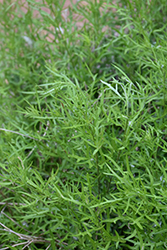Fri & Sat 8am - 8pm
Sun 8am - 7pm
Anytown, USA 12345
fax: 261.787.0463
e-mail: info@successgc.com


Plant Finder

Height: 30 inches
Spacing: 12 inches
Sunlight:
![]()
![]()
Hardiness Zone: 8b
Other Names: Golden Bush Daisy
Description:
A summer and fall blooming variety, featuring small, bright daisy flowers over airy, fern-like foliage; perfect for xeriscapes, alpine and rock gardens; resistant to critters and attracts butterflies; cut back to maintain a dense, shrubby appearance
Ornamental Features
Skeleton-leaf Goldeneye features dainty yellow daisy flowers with gold centers rising above the foliage from mid summer to mid fall. Its attractive tiny deeply cut ferny leaves remain bluish-green in color throughout the season.
Landscape Attributes
Skeleton-leaf Goldeneye is an herbaceous perennial with a mounded form. It brings an extremely fine and delicate texture to the garden composition and should be used to full effect.
This is a relatively low maintenance plant, and is best cleaned up in early spring before it resumes active growth for the season. It is a good choice for attracting birds, bees and butterflies to your yard, but is not particularly attractive to deer who tend to leave it alone in favor of tastier treats. Gardeners should be aware of the following characteristic(s) that may warrant special consideration;
- Self-Seeding
Skeleton-leaf Goldeneye is recommended for the following landscape applications;
- Mass Planting
- Rock/Alpine Gardens
- Border Edging
- General Garden Use
- Naturalizing And Woodland Gardens
- Container Planting
Planting & Growing
Skeleton-leaf Goldeneye will grow to be about 24 inches tall at maturity, with a spread of 24 inches. When grown in masses or used as a bedding plant, individual plants should be spaced approximately 12 inches apart. Its foliage tends to remain dense right to the ground, not requiring facer plants in front. It grows at a medium rate, and under ideal conditions can be expected to live for approximately 8 years. As an herbaceous perennial, this plant will usually die back to the crown each winter, and will regrow from the base each spring. Be careful not to disturb the crown in late winter when it may not be readily seen!
This plant does best in full sun to partial shade. It prefers dry to average moisture levels with very well-drained soil, and will often die in standing water. It is considered to be drought-tolerant, and thus makes an ideal choice for a low-water garden or xeriscape application. It is particular about its soil conditions, with a strong preference for poor, alkaline soils. It is quite intolerant of urban pollution, therefore inner city or urban streetside plantings are best avoided. This species is native to parts of North America..
Skeleton-leaf Goldeneye is a fine choice for the garden, but it is also a good selection for planting in outdoor pots and containers. It can be used either as 'filler' or as a 'thriller' in the 'spiller-thriller-filler' container combination, depending on the height and form of the other plants used in the container planting. It is even sizeable enough that it can be grown alone in a suitable container. Note that when growing plants in outdoor containers and baskets, they may require more frequent waterings than they would in the yard or garden.
